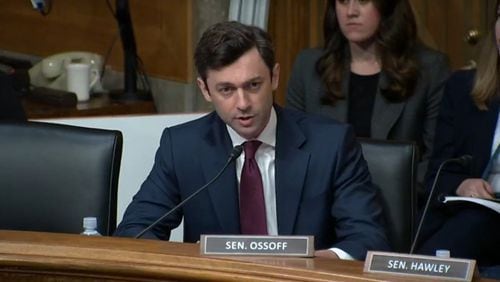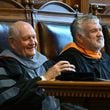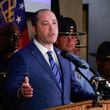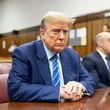Former AJC Falcons beat writer Matt Winkeljohn recalls the evolution of the Dirty Bird nickname and dance that became an Atlanta craze in 1998, the season of the Falcons’ first — and only previous — trip to the Super Bowl.
What began as just another day in the NFL, a cool autumn Sunday in Foxborough, Mass., became a revolution.
When the Falcons drilled the Patriots, 41-10 on Nov. 8, 1998, the “Dirty Birds” were christened into Atlanta sports lore with a funky dance that fans took as their own.
Running back Jamal Anderson first broke out the ditty in the Falcons’ 37-15 win over the Rams the previous Sunday, hopping up and down and flapping his arms like wings. Hardly anybody noticed.
Second-year tight end O.J. Santiago first shined real light to the Falcons a week later, flapping his arms and kind of hopping around after each of two touchdown catches in New England.
“I was the first one to do it the week before, but it wasn’t a big game,” Anderson said. “The New England game was a huge game for us, and O.J. was squawking, among other things.”
This was the Falcons’ coming-out party.
New England was two years removed from losing to Green Bay in the Super Bowl, and quarterback Drew Bledsoe led the Patriots back to the playoffs in 1997 under first-year coach Pete Carroll.
They would go to the playoffs again in ’98, and given that they entered the game favored by 4 1/2 points, the Falcons’ demolition made a lot of people take notice.
With a national TV audience watching, Santiago’s jig looked a bit odd when measured against other celebratory movements. He explained afterward that Anderson invented the Dirty Bird dance, but he took credit for spreading the label of Dirty Birds to the entire team.
“After the Philadelphia game (a 17-12 win on Sept. 13), an old guy in the stands pointed at me and said, ‘Dirty Birds, baby!’ and from then on I was saying it everywhere,” Santiago said. “I took it into the locker room, and before long, everybody was saying it.”
The dance and the label gave players and fans rallying points, and the team’s wipeout of the Pats was all the more reason for outsiders to pay attention.
Quarterback Chris Chandler completed 15 of 22 passes for 240 yards, two touchdowns and two interceptions. Anderson rushed 32 times for 104 yards and two scores. Terance Mathis caught eight passes for 117 yards.
The defense sacked Bledsoe six times, with safety Eugene Robinson and rookie reserve linebacker Keith Brooking picking off passes.
New England tried to make a game of it, going for it on fourth-and-2 at the Falcons’ 13-yard line while trailing 21-3 in the second quarter.
Defensive end Lester Archambeau sacked Bledsoe for a 16-yard loss, forcing a fumble. End Chuck Smith went 71 yards with it to score, and the rout was on.
Archambeau had 2.5 sacks and Smith added a pair. The Falcons forced four fumbles and recovered three.
Yet the lasting memory was that dance.
There were scads of highlights of Falcons, mostly Anderson, doing the dance as they carried an 11-game winning streak into the Super Bowl.
“O.J. Santiago was the first one to do it in a big-time, national game,” he said. “O.J. was like Jermaine Jackson. I am like Michael Jackson. O.J. took us to the point where everyone recognized us, but I made us platinum.”
Rolling all the way to Miami, the Falcons and their fans found, “Dirty Birds,” all over the place, on signs in the Georgia Dome, on T-shirts, hats and even billboards.
Even coach Dan Reeves gave the dance a try while on stage after the Falcons defeated Minnesota in overtime in the NFC Championship game.
“I would say that was the worst version,” linebacker Jessie Tuggle said. “It was good that he tried, though.”
About the Author





